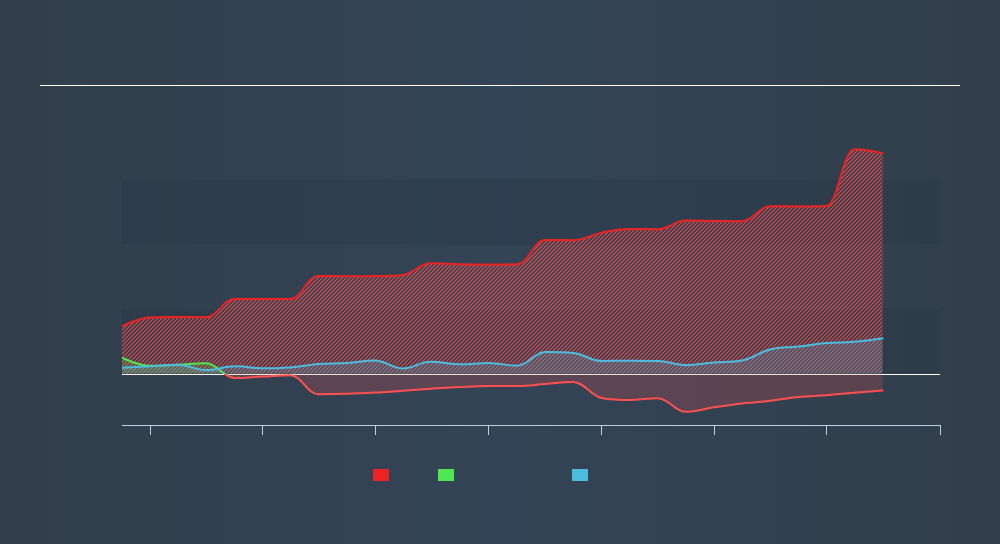- United States
- /
- Aerospace & Defense
- /
- NYSE:TDG
TransDigm Group (NYSE:TDG) Takes On Some Risk With Its Use Of Debt

David Iben put it well when he said, 'Volatility is not a risk we care about. What we care about is avoiding the permanent loss of capital.' It's only natural to consider a company's balance sheet when you examine how risky it is, since debt is often involved when a business collapses. We note that TransDigm Group Incorporated (NYSE:TDG) does have debt on its balance sheet. But should shareholders be worried about its use of debt?
When Is Debt Dangerous?
Debt and other liabilities become risky for a business when it cannot easily fulfill those obligations, either with free cash flow or by raising capital at an attractive price. If things get really bad, the lenders can take control of the business. However, a more common (but still painful) scenario is that it has to raise new equity capital at a low price, thus permanently diluting shareholders. Of course, plenty of companies use debt to fund growth, without any negative consequences. When we examine debt levels, we first consider both cash and debt levels, together.
See our latest analysis for TransDigm Group
How Much Debt Does TransDigm Group Carry?
You can click the graphic below for the historical numbers, but it shows that as of June 2019 TransDigm Group had US$17.0b of debt, an increase on US$12.9b, over one year. On the flip side, it has US$2.72b in cash leading to net debt of about US$14.3b.

How Strong Is TransDigm Group's Balance Sheet?
We can see from the most recent balance sheet that TransDigm Group had liabilities of US$1.38b falling due within a year, and liabilities of US$17.6b due beyond that. Offsetting this, it had US$2.72b in cash and US$1.21b in receivables that were due within 12 months. So it has liabilities totalling US$15.1b more than its cash and near-term receivables, combined.
While this might seem like a lot, it is not so bad since TransDigm Group has a huge market capitalization of US$27.4b, and so it could probably strengthen its balance sheet by raising capital if it needed to. However, it is still worthwhile taking a close look at its ability to pay off debt.
We measure a company's debt load relative to its earnings power by looking at its net debt divided by its earnings before interest, tax, depreciation, and amortization (EBITDA) and by calculating how easily its earnings before interest and tax (EBIT) cover its interest expense (interest cover). Thus we consider debt relative to earnings both with and without depreciation and amortization expenses.
With a net debt to EBITDA ratio of 6.6, it's fair to say TransDigm Group does have a significant amount of debt. But the good news is that it boasts fairly comforting interest cover of 2.5 times, suggesting it can responsibly service its obligations. On a lighter note, we note that TransDigm Group grew its EBIT by 23% in the last year. If sustained, this growth should make that debt evaporate like a scarce drinking water during an unnaturally hot summer. There's no doubt that we learn most about debt from the balance sheet. But ultimately the future profitability of the business will decide if TransDigm Group can strengthen its balance sheet over time. So if you want to see what the professionals think, you might find this free report on analyst profit forecasts to be interesting.
But our final consideration is also important, because a company cannot pay debt with paper profits; it needs cold hard cash. So we clearly need to look at whether that EBIT is leading to corresponding free cash flow. In the last three years, TransDigm Group's free cash flow amounted to 50% of its EBIT, less than we'd expect. That weak cash conversion makes it more difficult to handle indebtedness.
Our View
TransDigm Group's net debt to EBITDA was a real negative on this analysis, although the other factors we considered cast it in a significantly better light. For example its EBIT growth rate was refreshing. We think that TransDigm Group's debt does make it a bit risky, after considering the aforementioned data points together. Not all risk is bad, as it can boost share price returns if it pays off, but this debt risk is worth keeping in mind. Given our hesitation about the stock, it would be good to know if TransDigm Group insiders have sold any shares recently. You click here to find out if insiders have sold recently.
If, after all that, you're more interested in a fast growing company with a rock-solid balance sheet, then check out our list of net cash growth stocks without delay.
We aim to bring you long-term focused research analysis driven by fundamental data. Note that our analysis may not factor in the latest price-sensitive company announcements or qualitative material.
If you spot an error that warrants correction, please contact the editor at editorial-team@simplywallst.com. This article by Simply Wall St is general in nature. It does not constitute a recommendation to buy or sell any stock, and does not take account of your objectives, or your financial situation. Simply Wall St has no position in the stocks mentioned. Thank you for reading.
About NYSE:TDG
TransDigm Group
Designs, produces, and supplies aircraft components in the United States and internationally.
Acceptable track record low.
Similar Companies
Market Insights
Community Narratives


